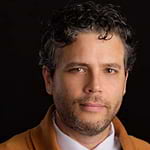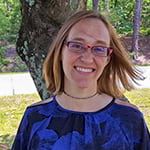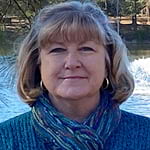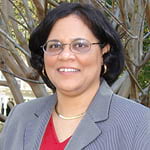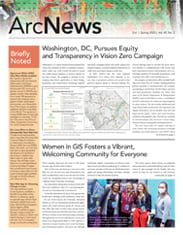In South Carolina, thousands of children struggle with developmental challenges every day. Addressing these issues early, when intervention can mean the most, starts with forming a clear understanding of the characteristics of the children and families most at risk for negative developmental outcomes.
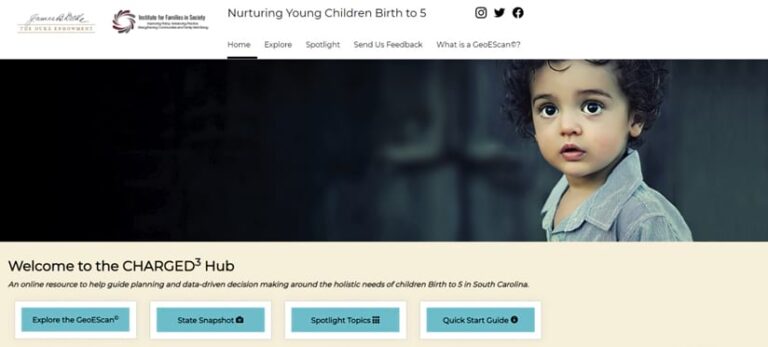
A critical part of creating strategic plans to support vulnerable children is identifying continuity-of-care options across a community’s medical, public health, social services, behavioral health, and educational systems. Gaining this level of understanding requires putting together an integrated, comprehensive picture of a community’s known patterns of risk and existing resources.
At the University of South Carolina’s Institute for Families in Society (IFS), researchers developed the Geospatial Environmental Scan (GeoEScan) to help people geographically explore South Carolina residents’ health characteristics and associated community resources. Although IFS staff members relied on GIS to do their research and present their analyses, the GeoEScan data was presented to non-GIS users in a bundled PDF that allowed them to explore maps and related data.
Recently, the team sought to move away from the PDF bundles and build a solution that would allow visitors to more easily interact with the data. After securing a grant from the Duke Endowment, IFS staff members used ArcGIS Hub to create the Children’s Health & Resource Geographic Exploration for Data-Driven Decisions (CHARGED3) initiative. Now, site visitors can use interactive web maps to explore and analyze different aspects of communities’ social determinants of health—such as poverty, childcare deserts, and access to health care—to help holistically address the needs of South Carolina’s children from the time they’re born until they reach age five years.
An Engaging, Accessible Geospatial Experience
The IFS team already used ArcGIS Pro and ArcGIS Online to store and process its GIS data, so it was a natural choice to implement ArcGIS Hub as the technology behind CHARGED3. It would give people who were already familiar with the bundled PDF a more engaging and accessible geospatial experience.
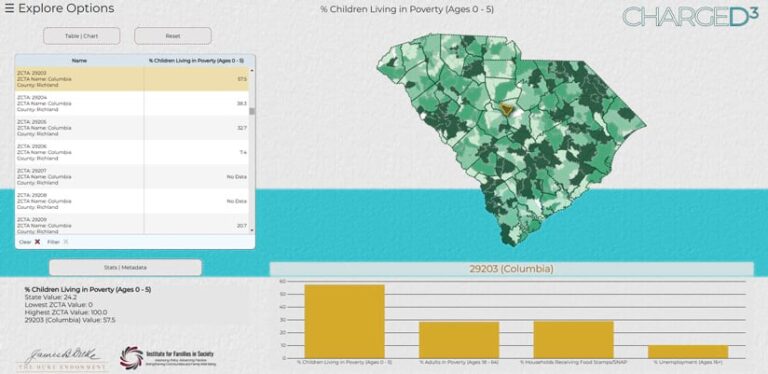
Employing ArcGIS Hub enabled the team to leverage IFS’s existing data; clearly organize and communicate the GeoEScan research; and create a comprehensive, branded web tool that allows users to interact with data in a web mapping experience. What’s more, the built-in content library in ArcGIS Hub helped the team easily manage the maps, metadata, and supporting documentation that would eventually be shared with the audience via the hub site.
Once the GIS team had established the CHARGED3 initiative in ArcGIS Hub, the site-editing capabilities made it easy to create and edit content. They also allowed team members to collaborate seamlessly with IFS’s design and graphics team. As development progressed, everyone involved could clearly and quickly solicit and communicate feedback about the site, as well as send updates to other stakeholders.
One of the goals of the CHARGED3 hub site was to be able to engage with people who use the website to ensure that the resources on it are helpful and usable. The team incorporated an ArcGIS Survey123 smart form into the hub site that lets users provide feedback on the content and usability of the site, as well as suggestions for additional content to feature. Submitted feedback goes directly into ArcGIS, where IFS developers can access and analyze the data. The team also added Google Analytics to the hub site to learn how visitors engage with the site and determine what needs to be improved in future updates.
Maps, Tables, and Metadata in a Single Experience
When visiting CHARGED3 Hub, users can explore the GeoEScan, see and download a snapshot of children’s well-being statistics for South Carolina, get background information on the initiative’s framework, and explore more information on contextual factors that can lead to developmental challenges—such as food insecurity and lack of childcare—through text, maps, charts, and ArcGIS StoryMaps stories.
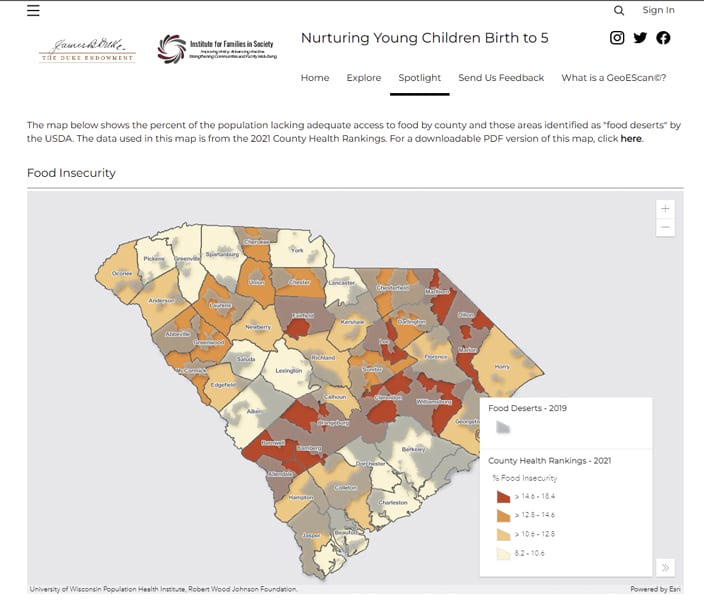
The hub site’s GeoEScan section features a data-rich interactive web map that shows the total population of children ages 0–5 years throughout South Carolina and lets users filter the data to have the map focus on particular regions or topics or show specific facilities, such as hospitals and childcare centers. The GeoEScan also exhibits a statewide summary table and extensive metadata, all in a single experience.
When community leaders, policy makers, and other stakeholders use the GeoEScan on CHARGED3 Hub, they can examine questions such as, Where are children with special needs located in the Midlands communities of South Carolina, and what resources are available to their families? Users can select the basemap that shows the percentage of children under age five years with a disability and zoom in on the Midlands region of the state. Then, they can activate facilities that promote children’s development and early interventions to find answers to their questions.
The authoritative data featured on the hub site comes from a variety of sources, including the United States Census Bureau’s American Community Survey, local and state agencies such as the South Carolina Department of Health and Environmental Control and the South Carolina Department of Social Services, and national agencies such as the Centers for Disease Control and Prevention and the National Healthy Start Association.
Since IFS announced the August 2021 launch of CHARGED3 Hub on social media, the site has seen regular traffic from new and returning users. Approximately 270 users per month download information from the hub site, with more exploring the site’s content. Additionally, IFS staff members have been invited to present the hub site at various events and introduced the work to agencies that run programs focused on early childhood development.
For more information, visit the IFS website or email IFS associate director Dr. Ana Lòpez-De Fede at ADEFEDE@mailbox.sc.edu.

